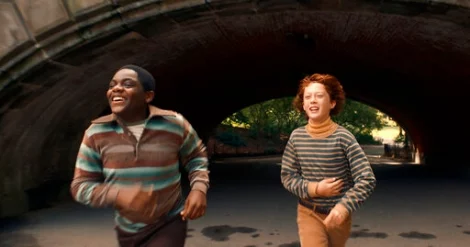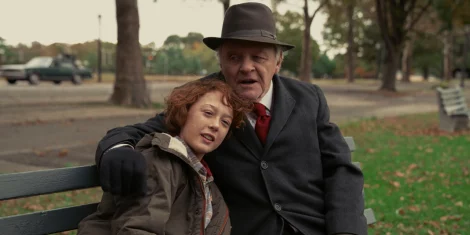Armageddon Time
Front Row at the Movies by Shirrel Rhoades
[mr_rating_result]Director James Gray (“The Lost City of Z”) has always been obsessed by the immigrant experience. Growing up in Flushing, New York, he was the descendant of Russian Jews from Ukraine. The family name was “Greyzerstein.”
 Gray’s first feature film was titled “Little Odessa,” a reference to Brighton Beach, a community in Brooklyn known for its high population of Russian-speaking immigrants. A later film was aptly titled “The Immigrant.”
Gray’s first feature film was titled “Little Odessa,” a reference to Brighton Beach, a community in Brooklyn known for its high population of Russian-speaking immigrants. A later film was aptly titled “The Immigrant.”
Now we come to the fictionalized story of his youth, “Armageddon Time.” It’s being described as a coming-of-age film – and it is that – but in many ways it’s more of an autobiography.
Or an indictment of one not standing up to racism.
That takes on greater resonance in these days of antisemitic rhetoric, hate crimes against Asians, and suppression of Blacks.
As Gray remembers the neighborhood of his youth, it was a “a hotbed of casual racism, a beneficiary of the baked-in racism of mainly white-run institutions, and the vanguard of the reactionary right’s – and the Trump family’s – political emergence.”
Here, Gray’s alter ego is a sixth grader named Paul Graff (played by Banks Repeta).
Paul explores Jews and Blacks as a united front against bias. This alliance is personified by Paul and his black friend Johnny (Jaylin Webb).
However, Paul’s actions get him sent to a private school, a stuffy institution where he encounters the Trump family.
The moral compass of the movie centers around Paul’s failure to speak up when racist remarks are made by students at his new private school.
Paul: “Sometimes kids at school say things about the Black kids.”
Grandpa: “What do you do when that happens?”
Paul: “Obviously, nothing.”
The wrong answer.
 “You were raised better than that,” reproaches his grandfather. The point being, if someone will say things against Blacks, those “same people who make racist remarks would just as likely vilify Jews.”
“You were raised better than that,” reproaches his grandfather. The point being, if someone will say things against Blacks, those “same people who make racist remarks would just as likely vilify Jews.”
Sound advice. But, Paul is conflicted by the casual racism he encounters within his own family. How does one deal with these moral vicissitudes of life as a young Jewish boy?
Speak up, is the answer.
But he doesn’t.
This is a burden of guilt that Paul – and perhaps James Gray – will carry into the future.
So you might say this film is something of an exorcism, trying to come to terms with harsh lessons from the past.
While the performances are sincere, Paul and Johnny are not deeply etched as characters. Nor are his parent (Jeremy Strong and Ann Hathaway) or even his ever-present grandfather (Anthony Hopkins). And the Trumps (John Diehl and Jessica Chastain) are merely wraiths hovering in the background.
The film takes its title from the song “Armageddon Time” by the Clash. Also, writer-director James Gray attributes this to Ronald Reagan. He recalls that the president was “always talking about Armageddon. He was always mentioning the world ending. It was cultural trauma. That weighed on kids in 1980.”
Email Shirrel: srhoades@aol.com


Ratings & Comments
[mr_rating_form]